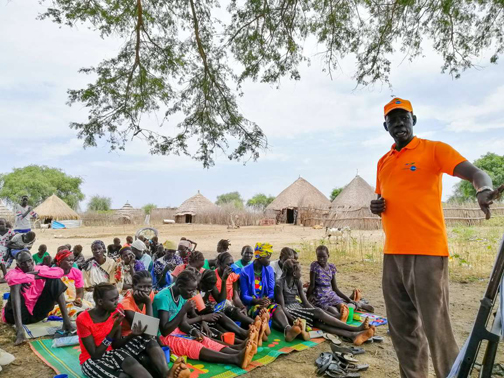Spoons on the Tray
 Training youth in Ulang.
Training youth in Ulang.
The war has quieted in many parts of South Sudan- not stopped, only slowed down. No celebrations. No joy. Only quiet, resentful relief. Rumors flew and contingency plans formed in the days running up to November 12- due date for major changes to be in place for a transitional government. The 12th came and went with no change- another 100-day reprieve extending to the middle of the dry season, peak fighting time. Elites speak of cautious optimism. I see harsh fatigue eroded into the faces of people, a traumatic exhaustion that stretches over generations.
A year ago near the beginning of the peace accord people spoke of their future, something I hadn’t heard in previous visits. Villages contained vibrancy; Shops- stalls really- popped up along the roads; Combatants could visit their families; People stayed out later at night; All indicators of peace.; There’s still hope, tarnished as it is. Still indicators but they are shrouded in layers of dust.
Revenge killings remain. In the state formerly known as Lakes, mothers who have lost sons put an extra spoon on the tray when serving food to the youth. It remains there until the youth kill someone else in revenge. The killings spiral and can quickly explode in a land where war has given license to all kinds of brutality.
Rachel, a veteran NP protection officer from Kenya, workeds in this area in a place called Rumbek. Among her duties, she helped form and support a Youth Protection Team. Youth gather once a week for training and to plan how they can reduce violence in their communities. They challenge and hold each other accountable. A month ago one of the boys- a term used for unmarried men into their thirties- skipped the training so he could participate in cattle raiding in the neighboring cattle camp. He was killed that night. The next week the Youth Protection team gathered. They talked about their friend’s death. They challenged each other about revenge. They talked about never ending violence. They understood that revenge would bring more revenge. They decided not to retaliate. A spoon was removed from the tray without anyone being killed.
It’s easy to discount this action as an isolated episode in such a bloody landscape. But the opposite is actually true. The fact that young men chose a different response contrary to historical and cultural practices, amplifies hope. Such acts prove another way is possible. They illuminate the plasticity of the human spirit. While official peace talks will proceed on multiple levels, these small, profound acts of courage and compassion carried out time and time again by youth and women and men weave the indelible threads of transformation and will remove the spoons from the country’s tray.
